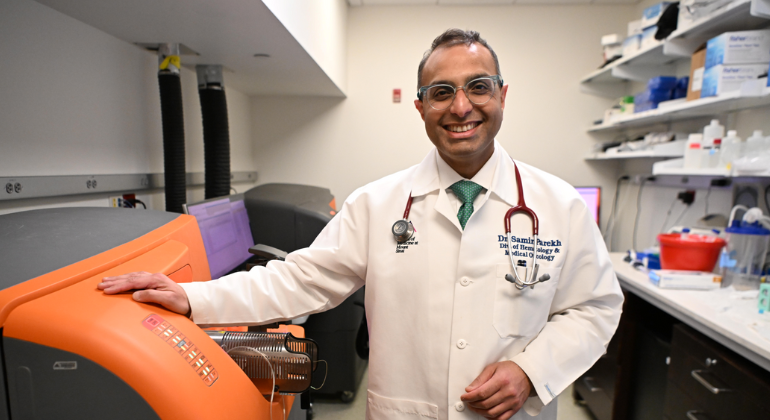William K. Oh, MD, Joins The Mount Sinai Medical Center As Chief of the Division of Hematology and Medical Oncology
William K. Oh, MD, is known for his expertise in using biological data banks to advance the understanding of cancer and cancer treatment.
William K. Oh, MD, an internationally recognized expert in the management of genitourinary (GU) malignancies, including prostate, renal, bladder, and testicular cancers, joined The Mount Sinai Medical Center September 1st as Chief of the Division of Hematology and Medical Oncology in the Department of Medicine. A leading clinical trialist, Dr. Oh is known for his expertise in using biological data banks to advance the understanding of cancer and cancer treatment. He developed a large clinical database and specimen repository for GU cancers that included samples from more than 8,000 patients, which yielded significant data about the development and treatment of prostate, renal, and bladder cancers.
At Mount Sinai, Dr. Oh will help lead in the development of a clinical database for prostate cancer with the goal of creating a larger specimen and clinical database for the Tisch Cancer Institute that will include multiples types of cancers. He will also serve as Co-Director of the Prostate Cancer Program, Associate Director for Clinical Research for The Tisch Cancer Institute, and as the Ezra M. Greenspan, MD Professor in Clinical Cancer Therapeutics, and Professor of Medicine and Urology.
Dr. Oh, with his considerable expertise in solid tumors, greatly enhances Mount Sinai’s ability to create a comprehensive, world-class center for cancer care, said Dennis S. Charney, MD, Dean of Mount Sinai School of Medicine and Executive Vice President for Academic Affairs of the Medical Center. "Clinician-researchers like Dr. Oh, who can bring a molecular understanding of cancer to bear on treatment, are at the forefront of translational oncology."
Adds Steven J. Burakoff, MD, Director of The Tisch Cancer Institute, "In Dr. Oh, we have found a cutting-edge clinical investigator who utilizes tumor banks and bioinformatics to understand the genetics of cancer."
During his 12 years as an attending physician at the Dana-Farber Cancer Institute (DFCI) and Brigham and Women’s Hospital, both in Boston, Dr. Oh became a national leader in developing clinical trials examining neoadjuvant chemotherapy in men with high-risk localized prostate cancer as well as in studying the role of platinum chemotherapy in castration-resistant prostate cancer. At Dana-Farber, Dr. Oh served as Clinical Director of the Lank Center for Genitourinary Oncology and Director of the Gelb Center for Translational Research and was the founding Chair of the Data and Safety Monitoring Committee for Phase I/II Trials at the Dana-Farber/Harvard Cancer Center. There, he developed a large clinical database and specimen repository for GU cancers that has enrolled more than 8,000 patients with prostate, renal and bladder cancer in the past decade.
The Dana-Farber database is unique in that it has richly annotated clinical data tied to human samples, including blood and tissue, DNA, RNA, sites of metastases, and treatment information. The sheer size of this database allows for a more specific characterization of the heterogeneous nature of the cancers being studied. Though still relatively new, the database has already resulted in the publication of dozens of papers ranging from clinical to blood-based genomic studies.
My primary research interest is prostate cancer and with a very active prostate cancer program at Mount Sinai, this is a great opportunity to build a comparable database within a short period of time, said Dr. Oh. "The size and diversity of the population of New York City will offer additional opportunities to establish a significant prostate cancer clinical database at Mount Sinai. The timing could not be better, because we are not beholden to the technologies of a decade ago when we started our database in Boston. Genetic and genomic information requires powerful storage and search capacities, which has improved significantly in recent years. When we build the new database at Mount Sinai, we will add improvements, such as building in Internet access capability, which will allow greater flexibility in entering data across multiple clinics and multiple sites as well as easier collaboration with other institutions. In addition, working with the Center for Bioinformatics at Mount Sinai, we will have the ability to automatically retrieve clinical data from electronic medical records."
Dr. Oh has authored more than 150 original articles, reviews, and book chapters on myriad topics, including the management of advanced prostate and renal cancer. He has recently edited two books on prostate cancer. He has served on the Cancer Education Committee of the American Society of Clinical Oncology (ASCO) and is a core member of the Genitourinary Committee of Cancer and Leukemia Group B (CALGB). In addition to reviewing for prominent journals such as the New England Journal of Medicine, Journal of Clinical Oncology, and Cancer, Dr. Oh co-edits "Testicular Cancer" for Up to Date, and is on the editorial boards of Clinical Genitourinary Cancer and American Journal of Hematology and Oncology.
A Native New Yorker, Dr. Oh earned his medical degree from New York University School of Medicine. He completed his residency in internal medicine at Brigham and Women’s Hospital in Boston. He subsequently completed a fellowship in medical oncology at the Dana-Farber Cancer Institute in 1997.
About The Mount Sinai Medical Center
The Mount Sinai Medical Center encompasses The Mount Sinai Hospital and Mount Sinai School of Medicine. The Mount Sinai Hospital is one of the nation’s oldest, largest and most-respected voluntary hospitals. Founded in 1852, Mount Sinai today is a 1,171-bed tertiary-care teaching facility that is internationally acclaimed for excellence in clinical care. Last year, nearly 50,000 people were treated at Mount Sinai as inpatients, and there were nearly 450,000 outpatient visits to the Medical Center.
Mount Sinai School of Medicine is internationally recognized as a leader in groundbreaking clinical and basic-science research, as well as having an innovative approach to medical education. With a faculty of more than 3,400 in 38 clinical and basic science departments and centers, Mount Sinai ranks among the top 20 medical schools in receipt of National Institute of Health (NIH) grants.
About the Mount Sinai Health System
Mount Sinai Health System is one of the largest academic medical systems in the New York metro area, with 48,000 employees working across seven hospitals, more than 400 outpatient practices, more than 600 research and clinical labs, a school of nursing, and a leading school of medicine and graduate education. Mount Sinai advances health for all people, everywhere, by taking on the most complex health care challenges of our time—discovering and applying new scientific learning and knowledge; developing safer, more effective treatments; educating the next generation of medical leaders and innovators; and supporting local communities by delivering high-quality care to all who need it.
Through the integration of its hospitals, labs, and schools, Mount Sinai offers comprehensive health care solutions from birth through geriatrics, leveraging innovative approaches such as artificial intelligence and informatics while keeping patients’ medical and emotional needs at the center of all treatment. The Health System includes approximately 9,000 primary and specialty care physicians and 11 free-standing joint-venture centers throughout the five boroughs of New York City, Westchester, Long Island, and Florida. Hospitals within the System are consistently ranked by Newsweek’s® “The World’s Best Smart Hospitals, Best in State Hospitals, World Best Hospitals and Best Specialty Hospitals” and by U.S. News & World Report's® “Best Hospitals” and “Best Children’s Hospitals.” The Mount Sinai Hospital is on the U.S. News & World Report® “Best Hospitals” Honor Roll for 2024-2025.
For more information, visit https://www.mountsinai.org or find Mount Sinai on Facebook, Instagram, LinkedIn, X, and YouTube.
Mount Sinai’s Staten Island Cancer Center Moves to New Site
Nov 09, 2023 View All Press Releases
Researchers Find Treatment Options for Patients Whose Blood Cancer Relapses After CAR-T
Nov 04, 2022 View All Press Releases
Study Identifies New Gene That Drives Colon Cancer
Oct 14, 2022 View All Press Releases
Mount Sinai Receives Grant to Enhance Patient-Centric, Team-Based Pancreatic Cancer Care
Apr 19, 2022 View All Press Releases
Molecular Treatment Is Able to Control Brain Metastasis of Different Tumors
Feb 11, 2022 View All Press Releases


